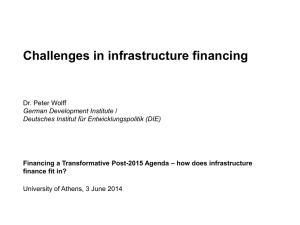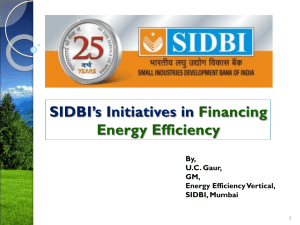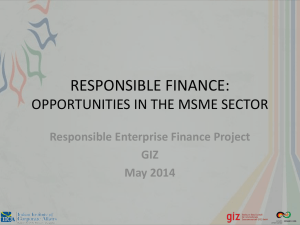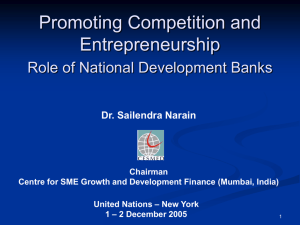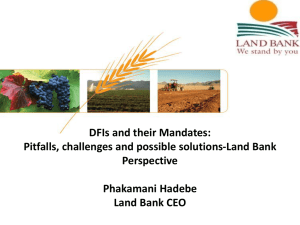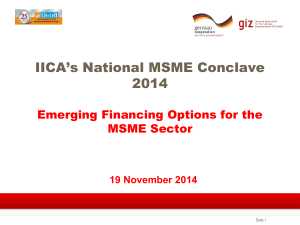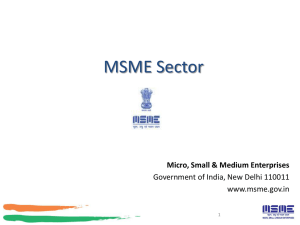Sushil Muhnot, Plenary 3
advertisement
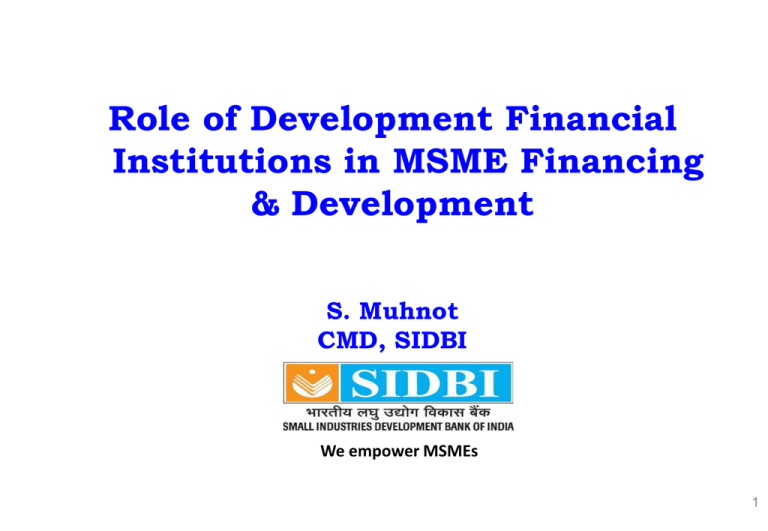
Role of Development Financial Institutions in MSME Financing & Development S. Muhnot CMD, SIDBI We empower MSMEs 1 MSME Sector : On a high growth path The role of a DFI is the most challenging as it is expected to meet both credit and developmental needs of the MSME sector, while maintaining the financial viability of their organisations. Expectations on DFIs to play ‘Credit-Plus’ role to fill the gaps in MSME eco-system, not addressed by banks/FIs. Meeting Financial gaps in niche areas. Providing need-based non-financial services Adopting Cluster Centric approach as MSMEs reside in clusters Upscaling promotional, developmental and socially responsible (CSR) support. 2 What Roles are played by DFIs as 'Change Agent' As a change agent, DFIs balance both development and commercial aspects of enterprise development by making judicious provision of financial and non financial services such that they trigger the passive market towards becoming vibrant and active. Facilitatio n of Access to Market Supportin g MSMEs at Bottom of Pyramid Market Maker Enable Market correction s DFIs to Act as Change Agent' Institution alization agents of financial public policies Facilitatin g Risk capital Inducing Innovations Role in national priorities DFIs role in Addressing financing Gaps To supplement and complement the efforts of banks by catering to niche areas. Risk / Equity Capital Banks neither have adequate risk assessment nor proactive in giving risk/equity capital. DFIs to act as Fund of Funds to provide risk / equity capital / seed financing through VC Funds / NBFCs / banks, as also directly. SIDBI pioneered Risk / Equity Capital support to MSMEs as subordinate debt / quasi-equity. Provided venture capital to MSMEs when no bank was providing. Set up incubation centres and linked venture finance to innovative enterprises. DFIs role in Addressing financing Gaps To address delayed payment – Reverse Factoring SIDBI took first step forward towards unique initiatives -Reverse Factoring Created an electronic platform for e-discounting of bills – faster credit disbursement. NSE Trade Receivable Engine for E–discounting with SIDBI (NTREES) Operates on RTGS basis instead of 3 -4 days in paper form Lower discount rates, quick transaction at less cost, safe and secure, transparent system for MSMEs. Promoting sustainability • Generally banks do not provide energy efficiency, climate change loans • SIDBI took the lead in filling this gap by providing such loans based on energy efficiency, environment protection and social standards. • Motivated banks to provide such facility. DFIs role in Addressing financing Gaps Cluster Finance DFIs to do Viability gap funding in cluster infrastructure DFIs can provide financial support for setting up of Common Facility Centres/ integrated infrastructure in MSME clusters. Can supports marketing infrastructure / showrooms to enhance marketing capacity in the sector. Supported Common facilities like technology Parks, IT centers. DFIs role in Addressing financing Gaps Addressing the ‘Missing Middle’ in the MSME spectrum Micro enterprises – so called ‘Missing Middle’ - are generally neglected by the formal financial institutions. SIDBI customised global tools – e.g. DOWNSCALE TO UPSCALE – Downscaling is ‘doing small loan profitably’ in a manner that sector upscales credit in the segment DFIs can engage in capacity building of the banking system for the purpose. DFIs role in Addressing financing Gaps Innovative Financial products and processes : Assimilating national and International best practices for stimulating access to finance. Ex. Promoting environment and social norms based credit is one of the biggest challenges globally. Innovative approaches – Capacity building of banks CART- an online rating, appraisal and documentation tool. • Explore new partners and empower them example -- SIDBI has brought in industry associations in the lending mechanism. • DFIs can explore routing credit through new intermediaries and channel partners to fill the gap in entire value chain especially micro enterprise lending e.g.. funding can be provided to channel partners viz. NBFCs, Factoring companies and others. DFIs role in Addressing financing Gaps Micro finance, supporting underserved/unserved regions and segments through innovative offerings of product/ process are their main drivers. In India, DFIs like SIDBI (MSMEs), NABARD (Agri) etc. have been addressing this. SIDBI took concrete steps in rejuvenating the micro finance domain by Strengthening a pool of sustainable Micro finance institutions. Launched MFI rating mechanism and introduced several measures for capacity building of these institutions which included equity, risk mitigation devices, and so on. DFIs role in Addressing non-financial Gaps Capacity building of MSMEs Financial Literacy Credit Facilitation SIDBI set up 3 Credit Facilitation Centres in neglected regions. Now initiating in 10 more. Capacity building of Business Member Organisations in 25 clusters Training and Skill Development in clusters, especially through e-learning. DFIs role in Addressing non-financial Gaps Cluster Development Under its cluster intervention it facilitated demand for and supply of Business Development Services and its match making with MSMEs expectations and needs. Over 1 lakh beneficiary with 1000 plus events on various issues i.e. skill development, energy efficiency, marketing, finance, productivity enhancement, quality etc. Other programmes include Sensitization/ awareness among MSMEs about BDS, Skill Development Programme, Capacity Building of BDS providers/BMOs. Facilitated financial linkages . Economic Empowerment – over 5000 trained youth got placed in clusters. Cross cluster learning through exposure visits, learn-shops, participation in trade fairs etc. ADFIAP Award 2011 for agenda on “Making Markets Work for Indian MSMEs” (2nd year in succession- in 2010 for local economic development). Recognition (World Bank, G 20) DFIs role in Addressing non-financial Gaps Filling the informational gap MSME Sector suffers from informational inefficiency DFIs to proactively bring awareness of schemes / facilities to the doorstep of MSMEs SIDBI is very active in • Conducting Awareness camps • Created a website – one stop solution for information for the needs of Budding Entrepreneurs, New Entrepreneurs as well as Existing Small Scale Entrepreneurs • National level virtual BDS – www.msmementor.com o Match making between MSMEs and expert service providers. o Over 8,000 consultants enrolled DFIs role in Addressing non-financial Gaps DFIs AS ENABLERS- Policy advocacy – Play a significant role in creating an enabling eco system for the sector. Role played through kindling dialogues and deliberations at State, National and international levels by various stakeholders, aimed at formulation of appropriate and coherent policy guidelines and regulatory norms for the sector. DFIs as leaders- Assimilating international best practices Play a significant role in identifying, developing and sharing best practices between different policy areas, disciplines, sectors and regions. Design new and innovative products to meet the emerging requirements of the sector. Act as guinea pig to establish that the model works. Partners with international DFIs and networks to adopt and adapt its approaches, strategies, products and processes such as to align with global competencies as also mitigate risks, reduce transaction cost, make efficient delivery channels and so on. DFIs role in Addressing non-financial Gaps Addressing the gaps in the institutional requirements MSMEs need various non-financial support by way of credit guarantee, credit rating, technology transfer. Banks generally do not provide these services. SIDBI constantly addressing the institutional gap by setting up of : Credit Guarantee Fund Trust for Micro and Small Enterprises (for credit guarantee), SME Rating Agency of India Ltd. (for credit rating), India SME Technology Services Ltd. (for technology transfer) DFIs role in Addressing non-financial Gaps Attend to unserved, underserved sector such that they are part of inclusive growth. DFIs should do all such roles which keeps it ahead of the curve and enables it to emerge as DIFFERENTIATOR Address thematic agendas of skill development, credit access, technology gaps etc. DFIs , while acting as a nodal agency for relevant ministries/departments of Government for their enterprise development/ MSME oriented schemes on cost plus basis, fruitfully serve the MSME domain. Loan appraisal, documentation, etc; loan syndication, mergers & acquisitions, valuation, rehabilitation, merchant banking services for SME exchanges, etc. SIDBI’s – Umbrella Network One Stop Solution for MSME sector Improve flow of Credit to MSMEs Credit Plus Approach Associate organizationsSpecialized functions Refinance Entrepreneurship / Enterprise promotion SVCL- Venture Capital Structured Products Credit delivery models SMERA- Credit Rating- Green Rating Direct Credit • Risk Capital • Sustainable Finance Business Development Services CGTMSE – Credit Guarantee- RSF Missing Middle – Downscaling ISTSL-Technology Transfer-pCDM Micro finance • Nurturing MFIs ISARC – Asset Reconstruction 16 Conclusion DFIs importance lies in addressing various gaps left unattended by formal financial system. DFIs have to be the CHANGEMAKERS AND DIFFERENTIATORS DFIs have to act as Laboratories for customising/ validating tools , products and services such that they are scaled up sustainably. By engaging in financial and non-financial services on fee basis, DFIs can be viable profit making institution to further the national agenda of inclusive, sustainable and faster economic growth. Thank you!
